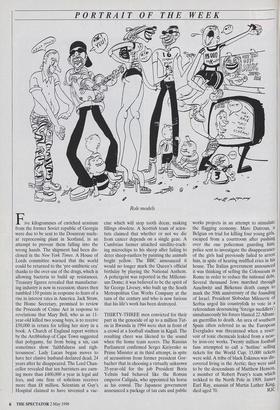PORTRAIT OF THE WEEK
Role models Five kilogrammes of enriched uranium from the former Soviet republic of Georgia were due to be sent to the Dounreay nucle- ar reprocessing plant in Scotland, in an attempt to prevent them falling into the wrong hands. The shipment had been dis- closed in the New York Times. A House of Lords committee warned that the world could be returned to the 'pre-antibiotic era' thanks to the over-use of the drugs, which is allowing bacteria to build up resistances. Treasury figures revealed that manufactur- ing industry is now in recession; shares then tumbled 150 points in response to fears of a rise in interest rates in America. Jack Straw, the Home Secretary, promised to review the Proceeds of Crime Act in response to revelations that Mary Bell, who as an 11- year-old killed two young boys, is to receive £50,000 in return for telling her story in a book. A Church of England report written by the Archbishop of Cape Town suggested that polygamy, far from being a sin, can sometimes show 'faithfulness and righ- teousness'. Lady Lucan began moves to have her elusive husband declared dead, 24 years after he disappeared. The Lord Chan- cellor revealed that ten barristers are earn- ing more than £400,000 a year in legal aid fees, and one firm of solicitors receives more than £8 million. Scientists at Guy's Hospital claimed to have invented a vac- cine which will stop tooth decay, making fillings obsolete. A Scottish team of scien- tists claimed that whether or not we die from cancer depends on a single gene. A Cumbrian farmer attached satellite-track- ing microchips to his sheep after failing to deter sheep-rustlers by painting the animals bright yellow. The BBC announced it would no longer mark the Queen's official birthday by playing the National Anthem. A poltergeist was reported in the Millenni- um Dome; it was believed to be the spirit of Sir George Livesey, who built up the South Metropolitan Gas Works Company at the turn of the century and who is now furious that his life's work has been destroyed.
THIRTY-THREE men convicted for their part in the genocide of up to a million Tut- sis in Rwanda in 1994 were shot in front of a crowd at a football stadium in Kigali. The resulting cheer was likened to the sound when the home team scores. The Russian Parliament confirmed Sergei Kiriyenko as Prime Minister at its third attempt, in spite of accusations from former president Gor- bachev that in choosing a virtually unknown 35-year-old for the job President Boris Yeltsin had behaved like the Roman emperor Caligula, who appointed his horse as his consul. The Japanese government announced a package of tax cuts and public works projects in an attempt to stimulate the flagging economy. Marc Dutroux, a Belgian on trial for killing four young girls, escaped from a courtroom after pushing over the one policeman guarding him; police sent to investigate the disappearance of the girls had previously failed to arrest him, in spite of hearing muffled cries in his house. The Italian government announced it was thinking of selling the Colosseum in Rome in order to reduce the national debt. Several thousand Jews marched through Auschwitz and Birkenau death camps to mark the 50th anniversary of the founding of Israel. President Slobodan Milosevic of Serbia urged his countryfolk to vote in a referendum denouncing 'foreign meddlers ; simultaneously his forces blasted 22 Albani- an guerrillas to death. An area of southern Spain often referred to as the European Everglades was threatened when a reser- voir of toxic chemicals leaked from a near- by iron-ore works. Twenty million football fans attempted to call a 'hotline' selling tickets for the World Cup; 15,000 tickets were sold. A tribe of black Eskimos was dis- covered living in the Arctic; they were said to be the descendants of Matthew Henson, a member of Robert Peary's team which trekked to the North Pole in 1909. James Earl Ray, assassin of Martin Luther King,


























































 Previous page
Previous page